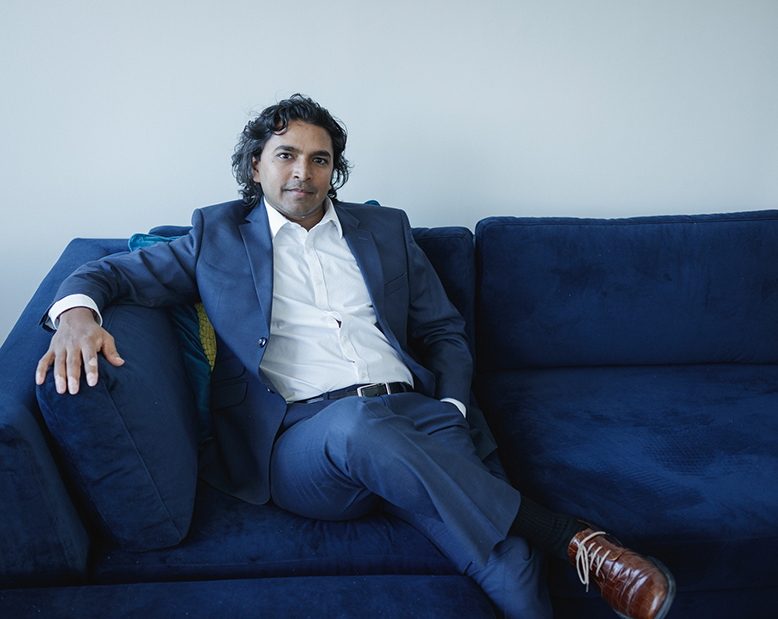
When he was a schoolboy in Hudson County, Charlie Patel’s parents often gave him additional homework assignments, such as reading all the words in the dictionary under the letter C. “I was pretty sure my friends were not going through this,” says Patel, now 37 and a successful Internet entrepreneur. He even had to quit baseball because his grades suffered slightly. “In Asian cultures,” Patel says, “if you get an A, your parents will ask why not an A plus.”
Patel was six when he immigrated to the United States with his family from Dingucha, a farming village in Gujarat, India’s westernmost state. In Dingucha, the family of five slept in one ground-floor room. Cows and oxen grazed outside their windows. Wheat was stored upstairs. There were no toilets.
Patel’s parents longed for a better life for their kids. But getting to the United States was no easy feat. His father, Ram Patel, the oldest son of his family, had to help his four siblings accumulate the funds to emigrate first. When Charlie and his family finally arrived, it was 30 years since Ram’s youngest sister had reached in North Bergen. Ram settled his family under the same roof as another sister until they were able to move to their own place in Union City. They later returned to North Bergen, where Charlie graduated from North Bergen High School.
Hudson County is a common landing place for new arrivals from India—second in New Jersey to Middlesex County, which itself has the second largest population of Indian immigrants of any county in the nation, according to Migration Policy Institute figures for 2011-2015. For that period, Middlesex had 103,300 Indian-born residents; Hudson County had 32,500.
In America, Ram found work at convenience stores and in New York’s Diamond District. Eventually, he managed a toy store in Cliffside Park. Charlie’s mom, Kanta, who speaks little English, spent 20 years folding napkins for distribution to restaurants.
As soon as they were old enough, Charlie (birth name Chirag) and his two brothers helped their parents make ends meet. His oldest brother, Nash, took a job as a janitor at 14. Charlie and his other brother, Suresh, did odd jobs, like selling Simpsons T-shirts outside the local grocery store or bagging groceries for tips. Charlie sometimes made only $2 a day.
Nash now works in finance at one of the world’s largest investment-services companies; Suresh is a pharmacist and owns several franchises. Charlie earned his bachelor’s degree at Drexel University in Philadelphia with a triple major in finance, international business and management information systems. After a series of high-paying positions at Accenture, Freddie Mac and GE Capital, he received a job offer from Fannie Mae. He came back with his own offer. “You have to hire my company,” he told them—but the company was non-existent at the time. “I had no idea how to start a business,” he recalls. Naturally, he called his brothers for advice. A consultancy was born.
It was the start of Charlie’s entrepreneurial career. In 2015, he cofounded 99 Robots, a digital marketing and web-development agency. Last year, he acquired Triberr, which helps bloggers and social-media influencers grow and monetize their networks. More recently, he acquired podcasts.com. He’s also the curator of the New Jersey Startup Digest, which provides information about startups and entrepreneurship events.
Charlie attributes much of his success to his family’s emphasis on education. The same is true of his siblings and his more than 30 cousins.
Amid their success, the family members strive to maintain traditional Indian values. Charlie and his German-born wife, Margrit, split their time between New York City and New Brunswick, with its large Indian population. Margrit learned to speak some Hindi to communicate with Charlie’s mother. There’s an understanding that everyone will live close by in case they are needed. Eventually, Charlie’s parents will move in with Charlie or one of his brothers.
The Patels continue to celebrate all the Indian holidays, and the entire family gets together for baby showers, anniversaries and other milestones. “When there are 50 or 100 people at a party, I consider that a small gathering,” he says. “There is a ridiculous amount of respect for our elders. We are never going to step on their beliefs or traditions, even though we now have our own.”
